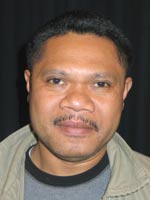
Yosef Ardi
By Leigh-Ashley Lipscomb
Spiky-haired Yosef Ardi weaves a grand, revolutionary narrative from the objects that surround him.
Cars, chemicals and cigarettes are all part of the story of the downfall of the dictator, Suharto, and the birth of a new era of political reform in Indonesia.
In his thirteen years as a business journalist for Indonesia's largest financial daily, Bisnis Indonesia, Yosef's reports on consumer goods sparked political activism throughout the nation. He aimed his pen at Suharto's weak spot - the economy - and wrote scathing reports when other journalists did not dare.
"The Indonesian people too easily forgive and too easily hope," he says. "I'm there to remind them."
His first big story featured a petrochemical company owned by Suharto's second son. Yosef discovered that Suharto used tariff production to protect his family's financial interests. Although the story ran with his editor's approval, the paper's shareholders visited Yosef at his small, corner desk in the newsroom. They asked him to stop investigating.
Several months later, Suharto's son invited him to the company's headquarters. The company Vice President pulled Yosef aside and said: "If you play tough, we'll play tougher."Yosef continued to write and by 1996 had received three legal notices from threatening corporate lawyers backed by Suharto's regime, and two more visits from anxious shareholders.
Perhaps Yosef's willingness to take risks as a writer stems from his background. He became independent when he left his home island of Flores to go to college at the Bogor Institute of Agriculture on the main island of Java. Yosef supported himself financially, earning most of his money by singing at local pubs. He moonlighted by the name of "Yosef Collins" (after the lead singer of Genesis) and crooned 80's hits throughout the college town. He still proclaims a love for performance and the guitar.
While in college, he was swept into the national student environmental movement. His first writing assignment was as an activist/reporter for a publication distributed by a local environmental non-governmental organization. After graduation in 1991, he landed a job at Bisnis Indonesia covering environmental issues. Later he branched into the technology, investment, manufacturing and trade beats.
Linked with his reporting career is his tobacco habit. When he writes, walks and talks, he smokes. He always smells like the spices from the cloves in his Gadang Garam brand cigarettes. His chain-smoking led him to another influential investigative story.
The price of Yosef's cigarettes skyrocketed during the 1990s. Clove farmers suffered because Suharto monopolized the industry for the benefit of one of his daughter's companies.
Yosef uncovered the corruption behind the rising cost of his cigarettes and reported it with relish.
In 1996 Yosef started another investigation that led to the story most dear to him. For one year he wrote articles about a national car project, Mobil Nasional, a monopoly that benefited Suharto's youngest son. His reporting incited the first nationwide protests against the Suharto regime.Two years later Suharto fell from power and a period of reform embraced the nation. The government instituted elections, anti-corruption laws and more civil liberties.
Yosef regrets he could not witness Suharto's demise in 1998. He was studying journalism in England as a recipient of the British Council's Cheevening Award based on his professional achievements. Instead Yosef relives the downfall of Suharto whenever his paper publishes a story related to the International Monetary Fund (IMF). As editor of fourteen of his newspaper's pages per day, he inserts a snapshot of Suharto beside every IMF story.
The picture shows Suharto sadly hunched over the contract authorizing IMF conditions. He is signing away his license to nepotism that included a prohibition against the national car scheme Yosef had publicized.
But Yosef is not just a rebel journalist, he is a recruiter. He is thrilled by the new wave of young reporters entering the profession of journalism since the onset of Reformasi. He tries to hook rookies on writing by teaching them hard-hitting, investigative reporting techniques and exercises flexibility.
In addition to editing, Yosef continues to write at least two stories per week as one of Indonesia's leading financial watchdogs. The same questions and convictions drive him now as during the Suharto era.
While a Visiting Scholar at U.C. Berkeley, Yosef is writing two books applying principles of economic justice to his nation. One book covers privatization, and the other tackles the IMF agreements that have shackled the Indonesian economy with US$80 billion debt.
"Who will be paying for this?" Yosef asks as he gestures towards an article about the national debt and hits the table with his fist. "The Indonesian people!" he answers.
For Yosef, the revolution is not over.
